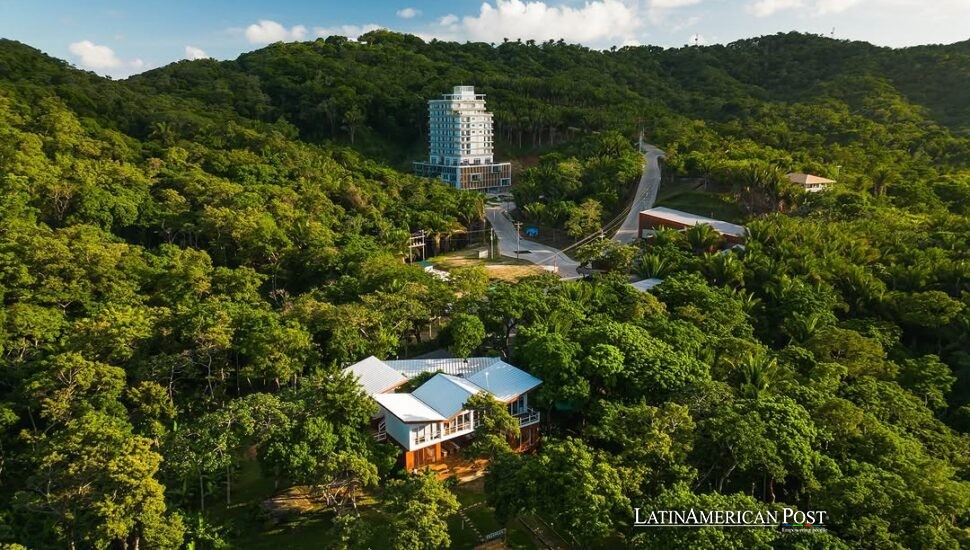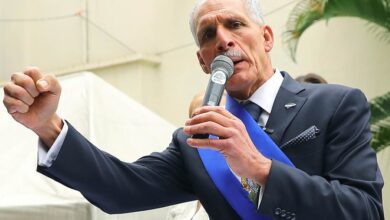Prospera Consortium's Enigmatic "Libertarian Experiment" in Honduras in Worldwide U.S. $11B Dispute

A once-grand libertarian vision in Honduras has devolved into a charged confrontation between project leaders, local communities, and the nation’s highest authorities. What began as a “city-state” promising opportunity now faces fierce opposition, multi-billion-dollar lawsuits, and waning public trust.
A Dazzling Beginning Amid Tropical Forests
Beneath lush green canopies in Roatán, an island off the Honduran coast, a formidable gated enclave known as Prospera juts out against the Caribbean Sea. High-rise condos and angular architecture contrast with the natural curves of a beach lapped by crystalline waters. From the outside, it appears to be a pristine private resort. Yet, Prospera is legally designated as a city—complete with a specialized regulatory code, ultra-low taxes, and a streamlined judicial system run by three retired judges from Arizona.
The project is primarily the brainchild of Venezuelan-born wealth fund manager Erick Brimen, who touts Prospera as “the world’s most ambitious experiment in self-governance” (cited by Bloomberg). The city’s promotional materials promise single-digit tax rates, an independent legal framework, and an absence of what Brimen calls “burdensome regulations.” Guests put their names on a short-term entry document before stepping into Prospera, binding themselves to follow its independent system of rules. As Bloomberg reports, the shared office spaces overflow with new companies next to production centers where machines construct parts – elements that reveal the settlement’s forward-looking plans.
Despite its glossy surface, fundamental conflicts remain at the heart of this project. The landscape of Honduras stands apart from standard places where one expects to find a free market settlement. This nation faces many obstacles: bribery in public offices, illicit activity networks, and residents lacking basic needs. The inhabitants of coastal areas near Prospera express concern that this development puts their traditional customs and practices at risk. For Brimen and his network of investors, a new political regime and an adverse court ruling have turned an idealistic plan for prosperity into a legal and diplomatic standoff.
Although Prospera once gathered support from Honduran leadership, the political tide has changed. As Bloomberg reports, the Honduran president who championed the “special economic zones” law that gave birth to Prospera is now in a U.S. prison on drug trafficking convictions. His successor, President Xiomara Castro, has denounced Prospera as a shady creation of the previous “narco-regime.” Her administration advanced a court challenge that deemed the law underpinning Prospera unconstitutional.
The Rise of a Libertarian Utopia
As Bloomberg explains, the concept behind Prospera belongs to a lineage of so-called “charter cities,” special jurisdictions that promise minimal interference from governments. This model has found enthusiastic champions in Silicon Valley circles: entrepreneurs, venture capitalists, and even influential public figures like Coinbase CEO Brian Armstrong have embraced it, lauding deregulation as a path to “transformative economic development.” They point to historical examples such as Hong Kong or Dubai—regions that used unique legal frameworks to draw foreign capital and fuel modernization.
In 2017, Brimen began working within Honduras’ “Zones for Employment and Economic Development” (ZEDE) law. The measure established committees authorized to create enclaves with near-complete autonomy over taxation, regulation, and even policing. According to Bloomberg, Brimen’s newly formed entity, Prospera, purchased land on Roatán and parts of the mainland, financed by $120 million in startup capital. This was followed by an influx of entrepreneurs enticed by 1% corporate income taxes, personal income taxes capped at 5%, and the freedom to pick or craft their industry regulations.
Visitors to Prospera’s oceanfront campus find a vibrant community. Speedboats connect a 14-story residential tower, a co-working complex, and a robotics-driven “Circular Factory” that repurposes raw materials. A golf course, “Pristine Bay,” offers a luxury retreat for startup founders and crypto enthusiasts. (Bloomberg also notes that “biohackers,” anti-aging researchers, and those seeking alternative healthcare treatments have flocked to Prospera, drawn by a favorable environment with minimal regulatory friction.)
As Erick Brimen told Bloomberg, the impetus stemmed from his childhood in Venezuela, where he witnessed the harm caused by corruption and overregulation. He initially attempted to implement “Prosperity Zones” in several U.S. states with the backing of some conservative economists. Still, he found that local officials resisted ceding so much autonomy to a private entity. Latin America, specifically Honduras, appeared more open to such radical experimentation. Bremen formed ties with influential figures, including the former Honduran president Juan Orlando Hernández, to secure Prospera’s legal carve-outs.
Throughout 2022 and 2023, the environment in Prospera was flush with optimism. Bloomberg cites that up to 50 companies established presences there, with 200 or so “registrants” enjoying the city’s minimal red tape. The concept soared in popularity among cryptocurrency advocates after conferences championing the theme “Make death optional,” blending radical health interventions with deregulation. During a 2023 summer summit, participants took in biotech panels and beach dance parties, culminating in the notion that Prospera “could change the world,” as Brimen told Bloomberg).
Mounting Opposition and Lawsuits
Such enthusiasm soon collided with stark realities. The new Honduran administration, led by Xiomara Castro, sought to dismantle the unique economic zone structure. She has cast the enclaves as threatening national sovereignty, describing them as “looting the nation for multinational capital” (Bloomberg paraphrase). Castro’s government and the Honduran Supreme Court effectively voided the original ZEDE law, labeling it unconstitutional.
In response, Brimen filed an $11 billion claim against Honduras with an international arbitration tribunal, asserting that shutting Prospera violates investor protections. The figure is staggering as it amounts to roughly a third of the country’s annual gross domestic product. Meanwhile, Honduras withdrew from the relevant treaty that permitted foreign arbitration, although legal experts believe it remains bound by preexisting agreements. According to Bloomberg, Brimen also actively lobbied Capitol Hill, obtaining letters from U.S. senators and representatives who threatened sanctions if Honduras did not reverse course.
Despite intense lobbying, local skepticism festers on Roatán—fishing hamlets like Crawfish Rock border the Prospera property. Many residents are Garifuna, a recognized Afro-indigenous community with special protections under Honduran law. However, claims that Prospera would create jobs have not soothed the locals’ fear of being displaced or overshadowed by wealthy foreigners. As Bloomberg reports, community leaders like Vanessa Cardenas accuse Prospera of imposing itself without genuine consultation. Others, such as local fisherman Tommy Connor, see potential for road improvements, sewage, and job creation.
Adding to the friction, the mayor of Roatán, Ron McNab, balked at the notion that a private city could flourish on island resources yet pay no municipal taxes. “They use our garbage dump, roads, and airports,” McNab told Bloomberg. “I don’t think it’s fair.” Last year, he posted a closure notice on one of Prospera’s properties, claiming it owed local taxes. The matter remains unresolved.
Prospera leadership contends that its mission is altruistic—intended to uplift Hondurans who have long been impoverished. “We’re not here at the expense of a nation-state,” Brimen insisted to Bloomberg. “We think it is more of a partnership.” Indeed, the developer maintains that 88% of the city-state’s tax revenue stays with Prospera, with the remainder placed in a trust for broader Honduran development. Yet this distinction between “private governance” and Honduran state control is precisely what Castro and her allies reject. They label the ZEDE arrangement a relic of Juan Orlando Hernández’s “narco-regime,” discredited by allegations of corruption and drug trafficking ties.
Future of the Libertarian Island Vision
For years, proponents of charter cities have claimed that such projects could liberate impoverished nations from bureaucratic inertia. Nobel Prize-winning economist Paul Romer initially supported the concept, hoping to spark growth by forging enclaves governed with transparency and fairness. But Romer now says that Prospera’s approach “is not even close” to what is needed to transform Honduras, calling the city a “gated community” that may isolate itself from the local populace. “They’re also living in this libertarian fantasy that they can be free of government,” he told Bloomberg. “That’s not gonna turn out well.”
From a realpolitik vantage point, the question is whether Prospera can sustain itself in an increasingly hostile environment. According to Stephen Moore, a former senior economic advisor to President Donald Trump who has offered guidance to Brimen’s cause, “We certainly did not bargain for this,” referencing the uphill legal and political battle. The city’s future now hinges on arbitration and whether the Honduran government can be persuaded to leave it intact.
Business founders such as Dusan Matuska continue to express optimism about their ventures. As the head of a Bitcoin learning facility in Prospera, he shared his perspective with Bloomberg: “From the start, I believed in private systems of governance.” He likes how the tax rules work with little complexity, plus the option to make payments in Bitcoin without getting lost in documents. Some biotech companies test therapies in the zone that might be prohibited in the U.S. As some attendees describe, even the “Aztec-themed” conferences revolve around radical life-extension theories. Overall, the community fosters a sense of creative freedom unmatched by typical regulatory environments.
Still, critics say that any “dream city” must cultivate a mutually beneficial relationship with the host country or risk a meltdown when the next election shifts the political wind. Mark Lutter, an early collaborator of Brimen’s, told Bloomberg, “A charter city’s success depends on a good relationship with the host country… It’s tough to be successful without that.” Indeed, Honduras has a general election in 2025, and Castro’s government continues to align with social welfare initiatives that counter Prospera’s hyper-capitalist approach.
With pending lawsuits, some watchers predict that the new investment could dry up if Prospera remains anchored in legal uncertainty. Others say the project’s ideological foundation—one that merges free-market orthodoxy with a utopian zeal—will endure among global venture capitalists. Freed from local red tape, or so the theory goes, entrepreneurs can move faster to develop cutting-edge technologies, whether that philosophy translates into real opportunity for thousands of impoverished Hondurans or draws an enclave of outsiders seeking minimal oversight.
In essence, Prospera’s fate is tethered to Honduras’s evolving stance. If the $11 billion lawsuit prevails, the state might be forced to reach a settlement or allow Prospera to operate. Through a different lens, should Roatán’s experimental jurisdiction lose momentum, this venture stands to become a lesson in how independent governance ideals collide with a nation’s authority. The project’s leader, Brimen, keeps his stance firm. In his statement to Bloomberg, he said: “This marks our beginning, not our end.”
Also Read: Mexico’s Aeroméxico Earns Title of Most Punctual Airline in 2024
During the creation of self-governing regions and business territories in Africa and Asia, the disagreement between Prospera and Honduras was an example of similar initiatives. The friction between these two sides gives other places a clear view of the problems they must consider as they move toward sovereignty. Spectacular beaches, robust marketing, and high-flying conferences have their appeal. Still, deep local integration—and stable national politics—will likely decide whether the “most ambitious experiment in self-governance” thrives or disintegrates. Only time will tell if the libertarian island dream ends as an $11 billion nightmare or if it manages to find a negotiated path toward genuine prosperity for all involved.





